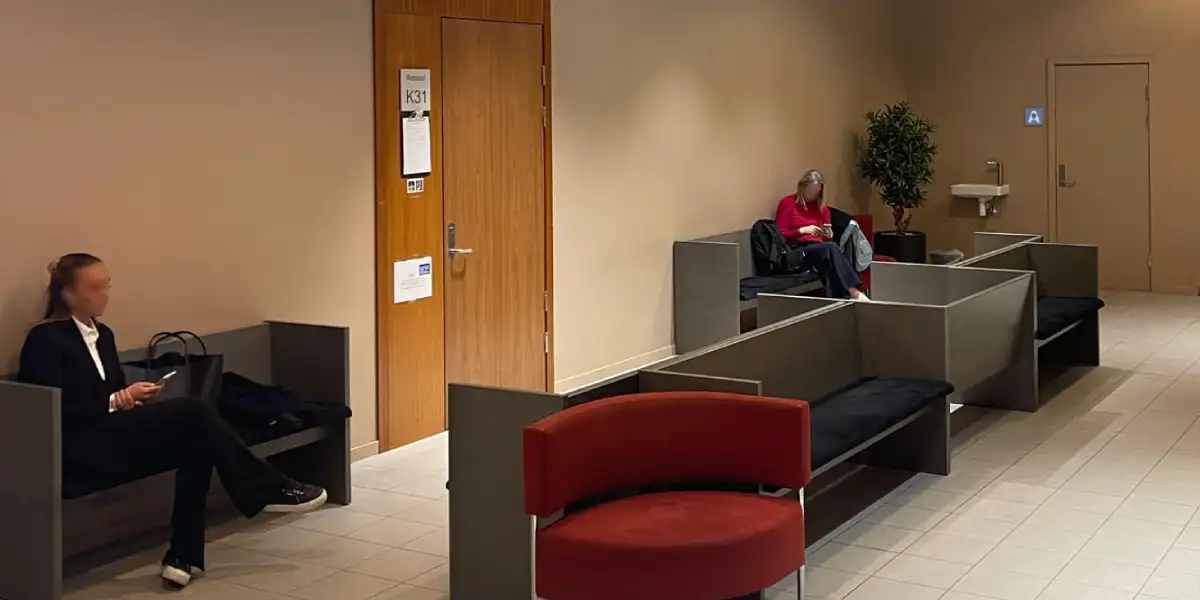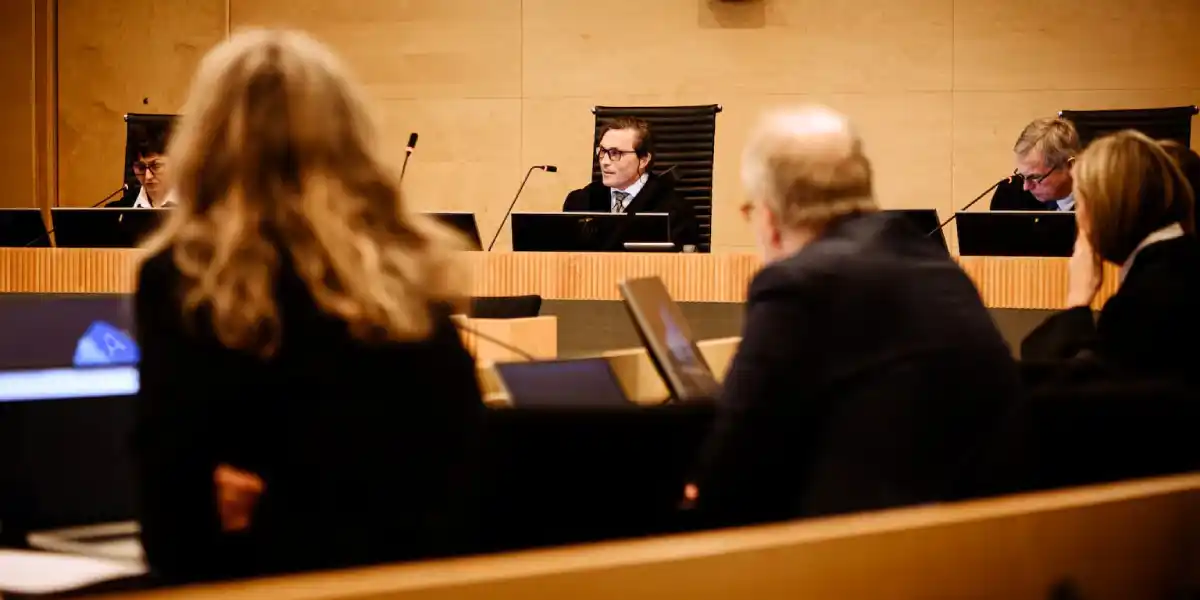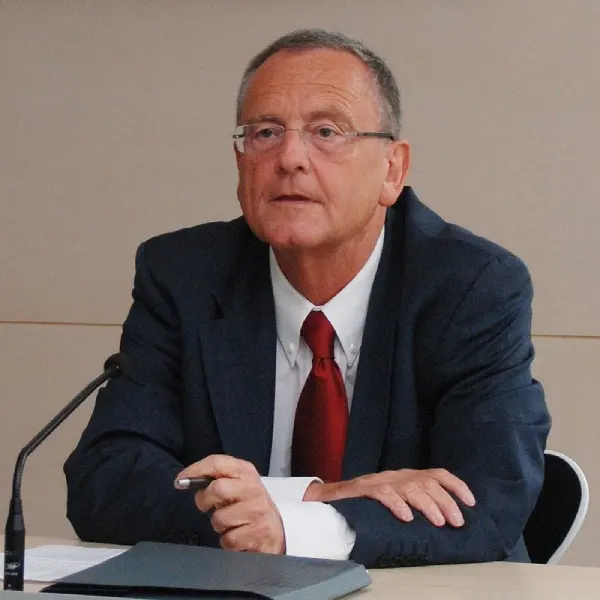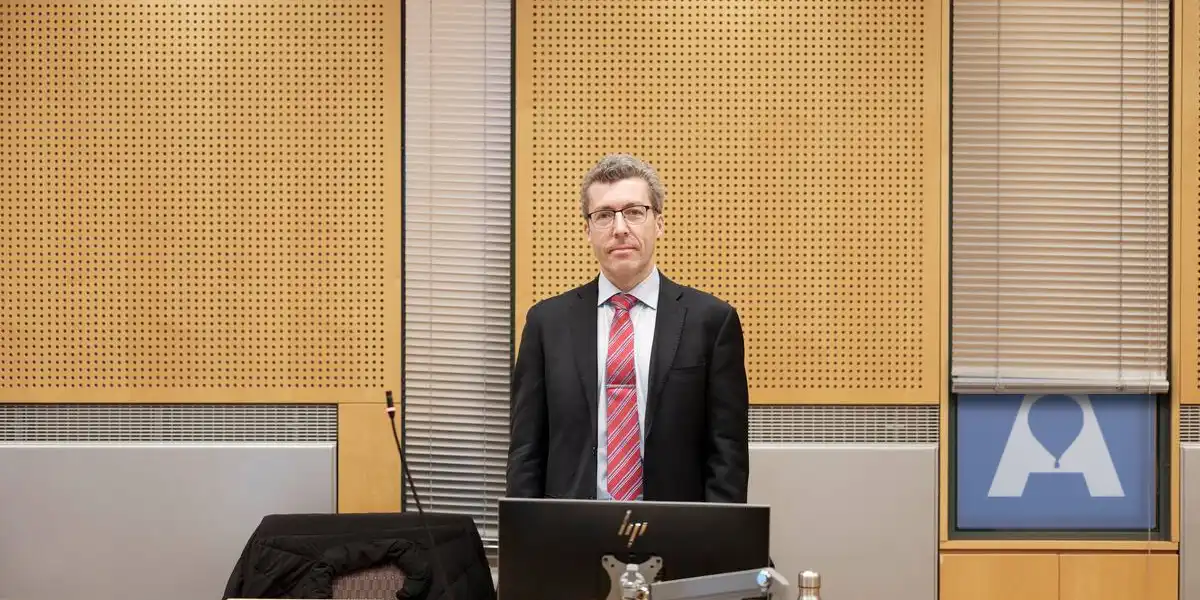More than 11 years revealing secrets because there is no excuse for secrecy in God’s true religion – The Watchtower, June 1st 1997; Dan 2:47; Matt 10:26; Mark 4:22; Luke 12:2; Acts 4:19, 20.

Courtroom K31, where the Jehovah’s Witnesses’ Appeal is being held; early morning before the day’s hearing starts.
Published By: Miss Usato, Last Updated: February 6th, 2025
It was a difficult time, knowing that I had disappointed Jehovah – Ms. Torp
Oslo, Norway—Today we report on proceedings for the fourth day of Jehovah’s Witnesses’ appeal against the state of Norway. Witnesses for the appellant continue to give their testimony before the court. There are 8 persons giving evidence today, including Professor Gerhard Besier, and Branch Representative Kåre Sæterhaug. We provide evidence from 7 of the witnesses.
Solveig Torp’s testimony covers her and her family’s experiences with Jehovah’s Witnesses (JW), including her initial interest, disfellowshipping, and return.
Her mother’s Bible study led to family opposition, but her father later became interested. Solveig was baptized at 15 but disfellowshipped at 22 after deciding she no longer wanted to be a JW. Under cross-examination by the state, she didn’t decide she didn’t want to be a JW. She decided to leave her husband and get together with a colleague.
She found disfellowshipping difficult but returned for spiritual and social support. She had to sit at the back. She said elders would occasionally speak with her. She supports the practice, believing it to be a loving arrangement.
Her children are also JWs, and she defends their maturity in making that choice. She rejects claims that JW is a closed community and criticizes the loss of government subsidies, feeling stigmatized for her beliefs.

Her children are also JWs, and she defends their maturity in making that choice. She rejects claims that JW is a closed community and criticizes the loss of government subsidies, feeling stigmatized for her beliefs.
Torp’s testimony reflects the terminology and perspectives commonly used by Jehovah’s Witnesses. For example, at the outset she talked about “pleasing Jehovah”, an expression only Jehovah’s Witnesses use to emphasize their loyalty and obedience to Jehovah.
She described disfellowshipping as “a loving arrangement”. This is the description often found in Jehovah’s Witnesses’ literature. It’s unlikely that Ms. Torp would describe disfellowshipping as a “loving arrangement” if she had never encountered that terminology in Jehovah’s Witnesses’ literature. The phrase is a well-known JW doctrinal expression, consistently used in their publications, talks, and teachings to frame disfellowshipping as a necessary, even beneficial, form of discipline.
If she had arrived at her views independently, she might describe the experience in more personal or neutral terms, such as “a difficult but necessary decision” or “a form of correction.” However, by using the specific JW phrase, it suggests she has internalized the organization’s explanation of disfellowshipping rather than formulating a description entirely on her own.
She spoke about “living a double life”. While outsiders might think of this as a life of deceit and hypocrisy, this is not what it means for Jehovah’s Witnesses. This phrase is often used by the organization to describe individuals who engage in behavior contrary to their beliefs while still identifying as Witnesses.
One could argue that she was living a life that aligned with her authentic self. However, that might conflict with the strict tenets of Jehovah’s Witnesses. Therefore, she lived a “double life”, secretly engaging in behaviors deemed unacceptable by the organization.
At one point she broke down crying as she told the court she “had disappointed Jehovah”. This is a strong emotional and doctrinal theme in the organization’s teachings, reinforcing accountability. It is rare outside of high control groups for people to feel such strong feelings of guilt for living their authentic lives.
She used other terms including, “biblical arrangement”, and concern about “stigmatization”, and “losing government subsidies”. The “biblical arrangement” is Jehovah’s Witnesses way to justify their practices including disfellowshipping and child baptism. The latter terms have been used frequently in JW materials (videos and written material on their website, and publications) to discuss opposition, religious persecution, and government restrictions as signs of the world’s opposition to what they believe to be is true worship.
While Ms. Torp may genuinely believe her statements, her language and reasoning align so closely with JW teachings that they suggest indoctrination rather than independent critical thought. Her testimony reflects a worldview shaped by the organization, making it difficult to separate her personal feelings from the doctrinal framework imposed on her.
I have a friend who is no longer a practising Jehovah’s Witness and she couldn’t go to meetings or conventions while she was with her boyfriend – Ms. Halland
Ms. Halland is 20 years old and was raised as a Jehovah’s Witness in a stable and supportive environment. Her mother passed away when she was young, and she moved to Oslo after her father remarried.
While she had many friends outside of the JW community, she did not feel pressured by her parents about attending meetings or preaching, viewing it as part of her routine. Although Jehovah’s Witnesses avoid certain celebrations, Ms. Halland felt she was allowed to make her own choices, including attending birthday parties and observing holidays.
She was baptized at 18 after reflecting on her faith. She doesn’t feel the fear of exclusion, as she understands its purpose in encouraging change based on love. However, she shared that a friend of hers who is no longer a practicing Jehovah’s Witnessed faced pressure to celebrate Christmas and her birthday even though she didn’t want to join in on those things. It appears that this girl’s boyfriend will not allow her to attend meetings or conventions of Jehovah’s Witnesses while she is with him.
During the defense’s questioning, Ms. Halland clarified that she had never been expelled from the congregation.
She described her typical week as an 11-12 year old, explaining that she attended meetings twice a week, spent time with her family to prepare, and once a week went preaching and had family study.
At around 16 or 17, she became an unbaptized publisher, which meant she was living a life in line with Biblical principles as if she were baptized, though no specific consequences occurred if someone struggled to fully live according to those principles.
She explained that when dealing with someone who is disfellowshipped, social contact is limited, and spiritual contact is broken, but they are still welcome to attend meetings.

My mother was a “hard-line opponent” – Ms. Sauer
Ms. Sauer tells the court that she is familiar with the practice of excommunication, as it was explained to her before baptism. She was eventually disfellowshipped The Witnesses' lawyer used the new term 'removed' instead of 'disfellowshipped'* from the congregation for about a year, after falling in love and being in a situation that conflicted with the congregation’s teachings.
She contacted the congregation elders due to a guilty conscience, wanting to resolve the “double life” she was living. During her ‘removal’ (similar to the term used for someone who has died and is about to be buried), she had no contact with the congregation, only maintaining social connections at work and with her partner. She found leaving difficult and missed the community but didn’t actively seek to return.
The reason for her return was a realization that what she had learned from the Jehovah’s Witnesses was correct. This was triggered by a comment from her partner. It made her think that he might be aligning with her mother who is seriously opposed to Jehovah’s Witnesses. This led to their breakup.
Reflecting on the excommunication process, she views it as two-sided: it serves to keep the congregation pure, while also providing the individual a chance to reflect on their actions.
During her cross-examination by the state, Ms. Sauer was asked about her contact with disfellowshipped individuals, to which she responded that they receive a brief greeting when she encounters such ones.
When asked about the teaching on exclusion, she explained that the Bible instructs Jehovah’s Witnesses to remove individuals from the congregation and avoid even eating with them. She explained that this same rule applies to those who leave the faith voluntarily.
She confirmed that she was an unbaptized publisher and was familiar with the term “bad association,” which refers to individuals whose behavior is contrary to biblical teachings.

Bratås is 18 years old, with both his parents being Jehovah’s Witnesses. He has one sister who is also a member, while the other is not. They have a normal relationship with their non-JW sister.
Growing up, he didn’t experience many strict rules beyond the usual, though there were extra rules related to JW teachings, particularly regarding substances like drugs, tobacco, and alcohol.
He was baptized less than 2 years ago after a period of Bible study and discussions with elders to ensure he understood the faith. He didn’t feel pressured to be baptized and felt free to make his own choices.
While he has faced teasing from students and some teachers at school because of his religious beliefs, he has always been informed about the concept of exclusion and has never been afraid of it.
When asked if exclusion would be an obstacle to leaving the JW faith, he hesitated but stated that they could leave whenever they wanted and he didn’t see it as a direct obstacle.
In cross examination by the state, Bratås testified that his sister has never been a Jehovah’s Witness (JW) and would never become one.
He said he was baptized at 16 and knew about the disfellowshipping arrangement beforehand, as it was discussed in meetings and explained through Bible references in the Watchtower.
He described disfellowshipping as a process for individuals who commit serious sins and continue to believe such behavior is acceptable, leading to a break in normal association with the congregation.
He acknowledged the possibility of this happening to him and the impact it could have on family relationships, though he seemed resigned to it as part of the faith’s teachings.
Regarding rules, he explained that the Bible prohibits premarital sex and relationships with non-JWs, including having a girlfriend who is not a JW.
As an unbaptized preacher, he was allowed to preach on his own. When asked about the practice of exclusion, he confirmed that he was told to follow it, although he said this like he was asking a question.
Mr Fillingsnes was raised as a Jehovah’s Witness with his mother, father, and two sisters, one of whom is not a JW. He had a good upbringing but chose not to become a JW as a youth.
He began using drugs early, which escalated over ten years, leading to partying and mental health issues. His parents were saddened by his lifestyle, and although he lived at home for some time, his drug use continued.
Eventually, he realized he couldn’t continue down this path and sought help from the public sector, though he struggled to quit drugs.
At some point, Jehovah’s Witnesses came to his door offering Bible study. Feeling he needed help, he decided to give it a try and committed to quitting drugs. He found that becoming a JW had a very positive impact, as he gained supportive friends in the congregation and entered a healthier environment.
John mentioned that one of his sisters had been disfellowshipped Here again the new term 'removed' was used instead of 'disfellowshipping' indicating that they can change terms as quickly as they can change their underpants, and all follow suit.*from the congregation, but he maintained contact with her. He was not baptized at that time.
He is now married and had a civil ceremony at the town hall, which felt a bit strange since they had initially wanted to marry at the Kingdom Hall but had to go to the town hall the day before. They held a gathering at the Kingdom Hall on Saturday after the ceremony.
Under cross-examination, he said that he was baptized in 2015. He said he had attended Jehovah’s Witness weddings before they lost funding and was asked about the comparison in terms of ritual. He claimed he didn’t understand the question. He answered, “we can’t get married”.
Former members stories might be distorted or incomplete – Prof. Besier

Professor Gerhard Besier, holds a doctorate in theology and history and is a professor of history and biology. He explained that Jehovah’s Witnesses have faced persecution throughout history, including arrests in Germany when preaching was banned.
In a historical context, most European countries now recognize Jehovah’s Witnesses as a legitimate religious group.
Regarding integration, Besier noted that Jehovah’s Witnesses’ children participate in public schools, kindergartens, and various activities like other children. They are not socially isolated in everyday life compared to children from other religious communities.
When asked about the practice of exclusion, Besier explained that it is meant to encourage reflection and repentance, helping members return to the congregation.
He said this practice has evolved since March 2024 to allow Bible study with those who have not yet returned. While exclusion is not intended to cause social isolation, it can be viewed as an unfavorable arrangement.
He compared exclusion to a penalty, like revoking a driver’s license for breaking traffic rules, and pointed out that emotional distancing occurs in many social contexts when people change groups.
He also discussed how religion can help people cope with trauma and mental illness, suggesting that religious individuals may have better mental health outcomes than non-religious people.
In terms of exclusion, the practice is common in many Christian communities, though some take it more seriously than others. For Jehovah’s Witnesses, exclusion is important because it aligns with their interpretation of biblical teachings.
Besier compared the psychological challenges of leaving a religious group, like Jehovah’s Witnesses, to the difficulties faced when leaving any social group, such as a sports team, noting that emotional distress and feelings of loss are common across all communities.
Besier, during cross-examination by the state, confirmed that he has conducted research on Jehovah’s Witnesses. He agreed with their view of being cautious when listening to those who have left the congregation, suggesting that one should primarily listen to active JWs. He acknowledged that while the stories of former members can be valuable, they might be distorted and incomplete.
When asked about the concept of “shunning,” Besier clarified that he was referring to “removal” from the congregation, not shunning. He explained that the goal of removal is to encourage individuals to return to the congregation, as the intention is for those who have sinned to repent and rejoin the community.
Besier denied that JWs practice shunning, stating that they are more diplomatic now than in the past. While he acknowledged that some families are stricter about limiting contact with disfellowshipped individuals, he argued that this does not represent the practice of JWs as a whole. He insisted that JWs no longer practice “excommunication” and have changed their approach, now aiming to help those who leave the faith.
He also compared this practice of limiting contact with ex-members to similar practices in other conservative religious communities, such as the Lutheran Church in Norway, which follows a similar procedure.

Kåre Sæterhaug, is a board member of the Jehovah’s Witnesses in Norway, and is based at their Scandinavian Headquarters in Holbaek, Denmark. His testimony provides insights into the practices and beliefs of Jehovah’s Witnesses, with a focus on the community structure, baptism process, and the concept of exclusion or removal from the congregation.
Sæterhaug explains that Jehovah’s Witnesses prioritize a personal relationship with God over just acquiring knowledge. Their study process is seen as fostering this relationship rather than simply imparting facts. Each individual is encouraged to make personal decisions based on their conscience.
Regarding the role of congregation elders, he says Jehovah’s Witnesses do not have priests or bishops. Instead, they have elders, who are laypeople with qualifications outlined in the Bible. Elders serve as resources for comfort, help, and teaching, and they are seen as co-workers, not leaders.
Elders maintain confidentiality similar to priests, he claims. What members share with elders remains within the congregation, and members are encouraged to seek comfort and advice from them.
He explains that the governing body of Jehovah’s Witnesses is a group that oversees congregations. It is considered to be similar to the biblical model, with its role focused on publishing literature and guiding the community.
He describes baptism as a significant decision that follows a period of study. The process includes the consideration of an individual’s spiritual maturity.
The term “removed from the congregation” is now used instead of “excluded,” he says, with the belief that individuals who no longer wish to be part of the congregation can simply announce their decision. Serious sins are considered rare causes for removal, and the practice of disfellowshipping is seen as rare, particularly for minors.
He compares their exclusion practice to “social distancing” from individuals who are seen as unrepentant or engaged in serious sin. This is based on biblical teachings about not associating with individuals who continue in sinful behavior. However, individuals who become inactive or who drift away are not socially avoided, and family ties are not typically broken.
He notes that the practice of “removal” from the congregation has been adjusted over time. While some people may choose to be removed due to personal struggles or a desire to stop living a double life, the community does not actively avoid individuals who become inactive or who face difficulties.
The common thread throughout today’s proceedings is that those who are expelled from Jehovah’s Witnesses do not lose contact with family and friends. Yet, today’s court witnesses would not make themselves available for interview by the media because they claim their experience is “negative and stigmatizing”. At least, that is the excuse given by spokesman for Jehovah’s Witnesses, Jørgen Pedersen.
Considering the testimonies given today on behalf of Jehovah’s Witnesses, they see exclusion as a practice intended to encourage individuals to reflect on their actions and return to the congregation. They claim it is a form of discipline to encourage repentance and spiritual reconciliation.
Besier suggests that the exclusion practice has become more diplomatic over time; that there is a shift towards less harsh forms of exclusion. However, he doesn’t provide any evidence of how this revised exclusion process works.
Additionally, Besier side-stepped the shunning question by discussing “removal” and looked at that as playing a positive role in encouraging individuals to return to the congregation. Avoiding the real consequences of “removal” or “disfellowshipping” manipulates the facts to favor only one side.
Coupling that with the fact that he said former members stories might be distorted and incomplete, without providing evidence that they are, and his lack of acknowledgment that members’ stories might also be distorted and incomplete, results in a heavily biased testimony.
Overall, the testimonies suggest that exclusion is an integral but controversial practice in the Jehovah’s Witnesses community, intended to lead to spiritual correction and reintegration but also creating significant emotional challenges for those involved.
Dagen: Former Jehovah’s Witness supports the religious community
Gerhard Besier featured on Wikipedia
Gerhard Besier with links to CESNUR and Massimo Introvigne
Kåre Sætherhaug: Response to your letter regarding the assessment of state support for Jehovah’s Witnesses
Kåre Sætherhaug: Svar på deres brev angående vurdering av statsstøtte til Jehovas vitner
Office of the Attorney General, representing the State of Norway
Glittertind AS Law Firm representing Jehovah’s Witnesses
Reporter
Translator
Analysis